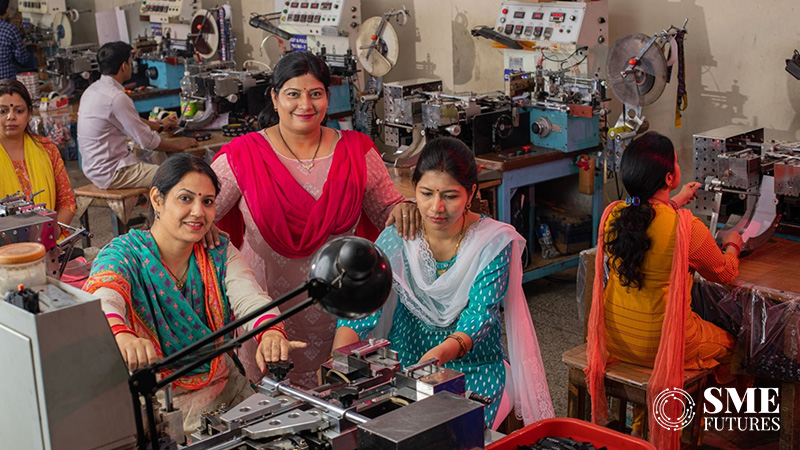Indian SMEs are adapting to the digital transformation taking place and adopting sustainability practices. However, they face inherent challenges in financing, as per a new report by the Federation of Indian Chambers of Commerce & Industry (FICCI). The report identifies the challenges and makes specific recommendations on how to overcome them.
Digitalisation of SMEs in India
Digitalisation has gained traction. SMEs in India have been increasingly adopting technology and digital solutions to enhance their competitiveness. This includes the use of e-commerce platforms, digital marketing, cloud computing, and automation tools.
The survey reveals that SMEs have been utilising digital technology across different business functions, with 60 percent of enterprises using digital tools for human resources, 51 percent for sales and marketing, and 48 percent for finance. The accounting software (such as Tally/ Vyapar/ Busy, etc.) and business applications like ERP and CRM were reported to be the most used digital tools by SMEs. What is noteworthy is that about 37 percent of enterprises surveyed were also using cloud-based business applications such as IaaS, PaaS, SaaS, etc.
Most of the firms have experienced improvements in productivity and reductions in operational costs as a result of incorporating digital technology into their business functions. Approximately 35 percent of respondents reported a reduction in their annual operational costs by 11-20 percent as a result of digitalisation. Another 30 percent of respondents indicated that their annual operational costs had decreased by more than 20 percent.
SMEs have also been leveraging e-commerce platforms and online marketplaces to reach a larger customer base and expand their market presence. These platforms provide opportunities for SMEs to showcase and sell their products nationally and globally. In terms of online markets and sales platforms, a significant 71 percent of participating enterprises had their own online channels or sales platforms (such as a website to display or sell products).
Amongst the enterprises that reported selling through online channel(s), 24 percent reported that more than half (50 to 75 percent) of their overall sales came through online platforms like e-commerce platforms or own website. Another 39 percent respondents reported that one fourth to half of their sales were through such online platforms.
The adoption of online markets and sales platform has increased their sales, profits as well as reach to customers.
The study also brings to fore some of the key challenges faced by SMEs in integrating technology in business functions, especially in on-boarding on e-commerce platforms. About 40 percent of respondents highlighted lack of skilled resources and technological expertise required to effectively integrate and operate these technologies, as well as limited knowledge of business-specific technology solutions.
While there is a government scheme “Digital MSME” as a part of the Champions Scheme to promote digital adoption amongst MSMEs enterprises, there is perhaps a need to create greater awareness about the scheme and its utility to the SMEs across India.
SMEs in India can also take advantage of Digital Public Infrastructure (DPI) for improving their access to finance and access to markets. For instance, the GeM (2016) portal for public procurement and the TReDS (2014) platform for receivables financing have been instrumental for development of SMEs in India. The survey findings reveal that while there is reasonable awareness about these platforms amongst the SMEs, there is a scope for further improving awareness and adoption of these platforms.
The two portals have high utility for SMEs and a further push may be given through capacity building workshops and awareness campaigns to increase SME registration on these platforms. Additionally, policy suggestions were offered to improve the performance of these platforms. In case of TReDS, the key suggestions offered include automatic publishing of GST registered MSMEs’ invoices on TReDS and deemed acceptance by corporates; allowing participation of State Government Agencies in TReDs; and making Customer Care Helpline of TReDS more robust. In case of GeM, the suggestions offered include reduction in charges and ensuring timely payment to SMEs.
Sustainability practices by SMEs in India
In recent years, there has been a growing emphasis on adoption of sustainable practices by Small and Medium Enterprises (SMEs) in India. By adopting sustainable practices, SMEs can mitigate their ecological footprint, optimise resource utilisation, and minimise waste generation.
Businesses have recognized the importance of integrating Environmental, Social, and Governance (ESG) practices into their operations, not only to meet regulatory requirements but also to improve their competitiveness and reputation.
FICCI study shows an overwhelming 72 percent of respondents were generally aware of sustainability and ESG practices. The importance of buyer support in implementing sustainability and ESG practices was instrumental as 64 percent of enterprises received guidance and support from their buyers.
Over the past two years, a significant number of surveyed enterprises have taken steps to adopt sustainable practices. The highest proportion of enterprises (41 percent) implemented measures to eliminate paper usage, demonstrating a growing awareness of the need to reduce waste and conserve resources, conserve water (41 percent), invest in green projects (39 percent), etc. The respondents also highlighted their priority for implementing sustainable practices over the next two years, which included the usage of renewable energy (36 percent), and investment in green projects (35 percent).
The enterprises have also reported benefits and cost savings by transitioning to green and sustainable practices including adoption of water conservation practices.
The respondents also highlighted the key impediments faced by SMEs in adopting sustainable practices. Majority respondents (42 percent) have indicated that time constraint is a key challenge in adopting sustainability practices, followed by limited funding (41 percent) and lack of incentives for implementation (41 percent).
In order to overcome these challenges, enterprises may invest in sustainability training and education, define clear goals and metrics for sustainability efforts, and establish partnerships and collaborations with other stakeholders in the industry. In-addition, approximately half of the respondents have suggested increasing awareness through targeted campaigns, training programs, etc. and providing subsidies or other benefits to incentivize compliance (35 percent).
Other issues and suggestions
While the study primarily focused on the digitalisation and sustainability preparedness of SMEs in India, the survey and discussions with SMEs also bring to fore some of the key challenges and issues faced by these enterprises in their day-to-day business. Besides the need for enhancing access to finance, the SMEs also highlighted issues with electricity supply and land leasing.
The key recommendations for improving the SME eco-system include improving access to finance, especially by laying emphasis on cash-flow based lending to SMEs. Another suggestion was to revise the classification norm of MSMEs in relation to NPAs from the current limit of 90 days to 180 days.
Other suggestions critical for improving growth and development of SMEs in India include regular monitoring and evaluation of government schemes for SMEs to ensure effective implementation; further simplification of processes and encouraging self-certification; creating single window for all compliances; easy access to land and infrastructure in industrial zones; and create institutional mechanisms for technology transfer.











